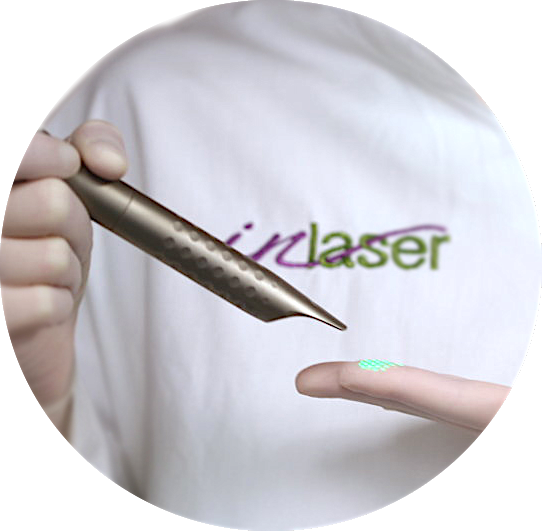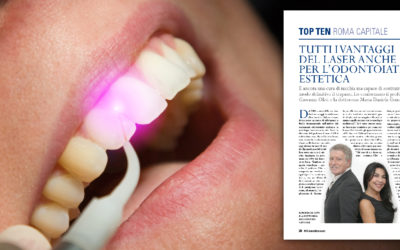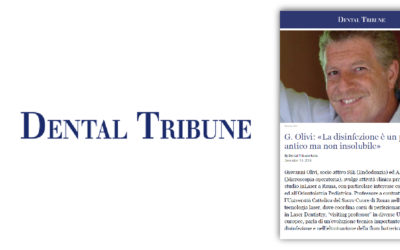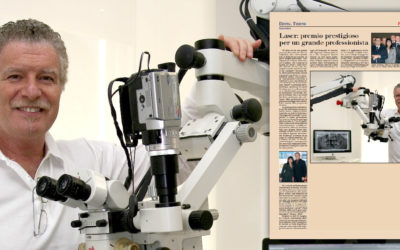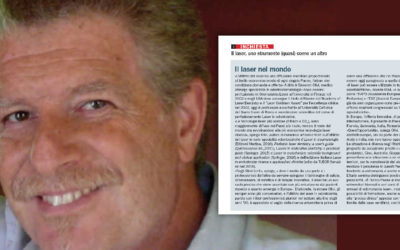Laser Dentistry
CUTTING EDGE LASER EQUIPMENTS
NO DRILL NO SHOT NO PAIN
Laser Dentistry
What is that?
The term “laser” stands for Light Amplification by Stimulated Emission of Radiation. Technically speaking, the laser is an instrument that emits photonic energy in the form of light.
Lasers allow the dentist to treat most problems in a safe way, giving excellent results and providing better comfort for the patient. Drs. Olivi and Genovese have devoted time, effort and resources to equip the InLaser centre with the most advanced laser technology available today.
our laser
Laser Dentistry
Everything
you need to know
Who it’s for
Thanks to its many advantages, laser dentistry is the perfect solution for patients of all ages who are suffering from problems with teeth, gums, or the oral mucosa. It is particularly adept for treatment of children due to its comfort and safety and for more vulnerable adult patients, due to the high level of control offered over bleeding and post-surgical infections.
How it works
The laser emits a beam of light that works with precision on the desired area, without touching it directly:
- In treatment of cavities, the laser “vaporizes” bacteria and carious tissue without damaging healthy teeth, while avoiding the unpleasant vibrations associated with the drill
- In treatment of gums and abscesses, the laser “disinfects” gingival pockets and infected teeth, bringing immediate relief from symptoms.
Furthermore, laser light improves the healing of the gums, biostimulating the natural physiological processes.
Main benefits
- Possibility to treat cavities of any shape and depth in a painless manner, without needing a drill
- Anesthetic is very rarely used
- Perfect decontamination of infected teeth and gums
- Rapid healing of gum tissue and very effective coagulation during surgery
- Absence or reduction of post-operative pain
Main clinical applications
Lasers are used in a wide range of therapies:
- caries detection
- removing caries from permanent and primary teeth
- revision of the lingual frenum: if too short, it can cause phonetic, orthodontic, and postural problems
- revision of the labial frenum, if it is causing orthodontic or periodontal problems (receding gums)
- operculectomy of overlying gingiva from wisdom teeth that are partially exposed and hence may lead to recurring abscesses (pericoronitis)
- uncover the implant during the second phase of dental implant surgery, thus avoiding a second surgical operation
- recontour the gum outline for aesthetic reasons
- remove swollen and infected tissue from the gingival pockets (non-surgical periodontal therapy)
- emergency treatment of dental abscesses
- decontaminate infected root canals during root canal therapy
- perform oral surgery (to remove small pathological neoformations)
- activate and accellerate the whitening process during cosmetic dental treatments
Frequently asked questions (FAQ)
Are lasers used in dentistry?
Yes, lasers have been used in dentistry since 1990. They can be used on their own, but often they used in combination with other dental instruments as a complementary technique in order to reach the best possible therapeutic result .
Are there different kinds of laser?
Yes, and they are characterized by the different wavelengths that makes them effective on different types of tissue: each kind of laser is more suited towards a specific therapy. There isn’t a single laser that can do everything!
Which lasers are used in dentistry?
Several lasers are used for treating the gums and oral mucosa (diode lasers, neodymium:YAG and CO2), others can treat gums as well as tooth and bone (erbium:YAG and erbium-chromium:YSGG). Some lasers are specifically suited towards tooth whitening (KTP and diode).
What are the advantages in using the laser?
- The dentist can replace the use of a drill with the so-called “water laser”, the erbium laser, thus eliminating or reducing the need for anesthetic and offering the patient the most relaxing treatment possible.
- Use of the laser makes it possible to save teeth that are heavily decayed. Devitalization can be avoided thanks to the technique of laser assisted dental pulp capping, which has a higher success rate than traditional techniques.
- The dentist can use the laser in place of the scalpel. In surgery, the laser offers good control over bleeding, and for this reason is the tool of choice for particular operations (fibromas, epulis, angiomas).
- Moreover, the laser significantly reduces both the symptoms and post-surgery recovery time, thanks to its effectiveness in reducing the amount of bacteria present in the gum and dental tissue and its biostimulating effects.
Are lasers safe?
If the laser is used according to the proper safety guidelines, and operated by a dentist trained in its use, it is an extremely safe instrument! In fact, in treatment of children it turns out to be much safer than traditional instruments due to its ability to focus on a tooth with selectivity (thus protecting the surrounding tissues, tongue and oral mucosa, from possible accidental traumas). Protective goggles must be worn at all times!
Laser Dentistry
Latest News
Il sorriso che vorrei? È made in Italy
Quante volte avete sognato il sorriso smagliante di George Clooney, Tom Cruise o Catherine Zeta-Jones? Vi sarete chiesti come fanno le star ad avere denti perfetti, bianchissimi e armoniosi. Sì, certamente alcune tra le più note celebrità del Pianeta sono state...
Un sorriso al laser: i vantaggi di una tecnica che mette KO il trapano
In Italia ha preso piede alla fine degli anni Novanta ma, ancora oggi, è considerata una tecnica di nicchia; il laser in odontoiatria ha portato numerosi vantaggi come raccontano il professor Giovanni Olivi, titolare del centro InLaser di Roma, e la dottoressa Maria...
Disinfezione canalare: una tecnica moderna per un problema antico
Un’evoluzione tecnica importante che riguarda l’antica questione della disinfezione e, quindi, dell’eliminazione della flora batterica nel canale, in particolare in endodonzia. Ce ne parla il dott. Giovanni Olivi, titolare del nostro centro InLaser di Roma, che si...
Un sorriso al laser: i vantaggi di una tecnica che mette KO il trapano
In Italia ha preso piede alla fine degli anni Novanta ma, ancora oggi, è considerata una tecnica di nicchia; il laser in odontoiatria ha portato numerosi vantaggi come raccontano il professor Giovanni Olivi, titolare del centro InLaser di Roma, e la dottoressa Maria...
Disinfezione canalare: una tecnica moderna per un problema antico
Un’evoluzione tecnica importante che riguarda l’antica questione della disinfezione e, quindi, dell’eliminazione della flora batterica nel canale, in particolare in endodonzia. Ce ne parla il dott. Giovanni Olivi, titolare del nostro centro InLaser di Roma, che si...
Premio prestigioso per un grande professionista
“E’ stata per me una grande sorpresa. Sinceramente non me l’aspettavo - dice - Anche perché non si tratta di un concorso al quale bisogna partecipare. L’assegnazione avviene attraverso un Comitato che esamina la qualità dei lavori e delle ricerche elaborate da chi,...
Il laser nel mondo
«L’utilizzo del laser ha una diffusione mondiale proporzionale al livello economico medio di ogni singolo Paese, fattore che condiziona domanda e offerta» A dirlo è Giovanni Olivi, medico chirurgo specialista in odontostomatologia: dopo essersi perfezionato in...
Contact us
Info and Reservations

Dental Practice
Dr. Olivi G. e Dr. Genovese M.D.
Address
ROMA - Piazza Francesco Cucchi, 3
Phone numbers
065815190
065809315

